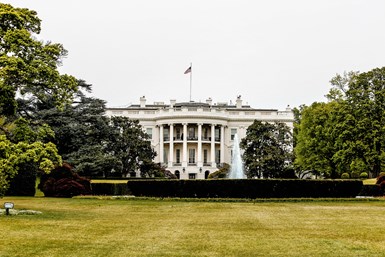Biden administration outlines efforts to ease supply chain bottlenecks
Ports of Los Angeles and Long Beach moving toward 24/7 operations, which will double the amount of cargo moved out of its docks and onto highways.
Edited by Margo Ellis

On Oct. 13, the administration convened
business leaders, port leaders and union leaders to discuss the challenges at ports across the country and actions each partner can take to address the delays and congestion across the transportation supply chain. And President Biden will meet with the leadership from the Ports of Los Angeles and Long Beach and the International Longshore and Warehouse Union (ILWU) to discuss the actions they are each taking to address these challenges in Southern California.
These leaders announced a series of public and private commitments to move more goods faster and strengthen the resiliency of our supply chains by moving toward 24-hours-per day, seven-days-per-week (24/7) operations at the Ports of Los Angeles and Long Beach. These two ports are the point of entry for 40% of containers to the United States and are on track to reach new highs in container traffic this year. Through August, Los Angeles has moved 30% more and Long Beach over 20% more containers to help U.S. exporters reach customers around the world and U.S families and factories get the goods they need. These commitments will speed up shipments of goods throughout the country and include:
The Port of Los Angeles is expanding to 24/7 operation. The Port of Long Beach expanded operations in mid-September. The Port of Los Angeles is now joining them by adding new off-peak night time shifts and weekend hours. This expansion means the Port of Los Angeles has nearly doubled the hours that cargo will be able to move out of its docks and on highways.
The International Longshore and Warehouse Union (ILWU) has announced its members are willing to work those extra shifts. This will add needed capacity to put towards clearing existing backlogs. This is an important first step, now the private businesses along the supply chain need to move their operations to 24/7.
Large companies are announcing they will use expanded hours to move more cargo off the docks, so ships can come to shore faster. Unlike leading ports around the world, U.S. ports have failed to realize the full possibility offered by operation on nights and weekends. Moving goods during off-peak hours can help move goods out of ports faster. For example, at the Port of Los Angeles, goods move 25% faster at night than during the day.
The commitments announced included:
- The nation’s largest retailer, Walmart, is committing to increase its use of night-time hours significantly and projects they could increase throughput by as much as 50% over the next several weeks.
- UPS is committing to an increased use of 24/7 operations and enhanced data sharing with the ports, which could allow it to move up to 20% more containers from the ports.
- FedEx is committing to work to combine an increase in night time hours with changes to trucking and rail use to increase the volume of containers it will move from the ports. Once these changes are in place, they could double the volume of cargo they can move out of the ports at night.
- Samsung is committing to move nearly 60% more containers out of these ports by operating 24/7 through the next 90 days. 72% of U.S. homes have at least one Samsung product, from appliances to consumer electronics.
- The Home Depot is committing to move up to 10% additional containers per week during the newly available off-peak port hours at the Ports of Los Angeles and Long Beach.
- Target, which is currently moving about 50% of its containers at night, has committed to increasing that amount by 10% during the next 90 days to help ease congestion at the ports.
Across these six companies more than 3,500 additional containers per week will move at night through the end of the year.
Those boxes contain consumer goods and pieces and parts that are sent to U.S. factories for our workers to assemble into products. These commitments aim to provide a market signal to the other businesses along the transportation supply chain—rails, trucks and warehouses—that there is demand to move additional cargo at off-peak hours.
Secretary Buttigieg and Port Envoy Porcari will continue to work with all stakeholders to help more businesses access these expanded hours and move the rest of the supply chain towards 24/7 operations.
This effort is part of the ongoing work of the Biden-Harris Supply Chain Disruptions Task Force to continue to identify emerging bottlenecks to the economic recovery and take action to clear them to help families, workers and businesses get the goods they need.
RELATED CONTENT
-
MSS Publishes Revised and New Industry Standards
The Manufacturers Standardization Society (MSS) of the Valve and Fittings Industry is excited to announce publication of the new Standard Practice SP-158-2021, Supplemental High-Pressure Gas Test Procedures for Valves.
-
Ancient Roman Valves
The story of water supply in the ancient Roman Empire is grand.
-
The Biggest Valves: Sizes Growing in Step with Greater Demand
Valve manufacturers that have the expertise, skills, equipment and facilities to produce large valves are rare.











 Unloading large gate valve.jpg;maxWidth=214)